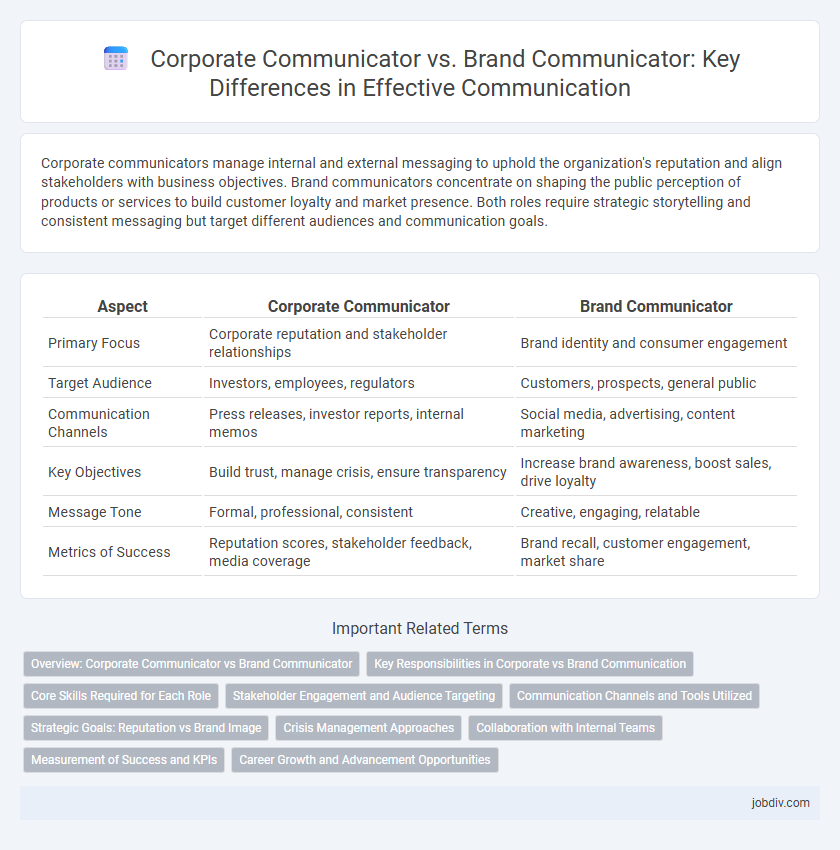Corporate communicators manage internal and external messaging to uphold the organization's reputation and align stakeholders with business objectives. Brand communicators concentrate on shaping the public perception of products or services to build customer loyalty and market presence. Both roles require strategic storytelling and consistent messaging but target different audiences and communication goals.
Table of Comparison
| Aspect | Corporate Communicator | Brand Communicator |
|---|---|---|
| Primary Focus | Corporate reputation and stakeholder relationships | Brand identity and consumer engagement |
| Target Audience | Investors, employees, regulators | Customers, prospects, general public |
| Communication Channels | Press releases, investor reports, internal memos | Social media, advertising, content marketing |
| Key Objectives | Build trust, manage crisis, ensure transparency | Increase brand awareness, boost sales, drive loyalty |
| Message Tone | Formal, professional, consistent | Creative, engaging, relatable |
| Metrics of Success | Reputation scores, stakeholder feedback, media coverage | Brand recall, customer engagement, market share |
Overview: Corporate Communicator vs Brand Communicator
Corporate communicators manage internal and external messaging to ensure alignment with the organization's mission, values, and stakeholder expectations. Brand communicators concentrate on shaping public perception, crafting brand identity, and driving consumer engagement through targeted marketing campaigns. Both roles require strategic messaging skills but differ in scope, with corporate communicators focusing on holistic organizational reputation and brand communicators emphasizing market positioning.
Key Responsibilities in Corporate vs Brand Communication
Corporate communicators manage internal and external messaging aimed at stakeholders, employees, and investors, focusing on reputation management, crisis communication, and corporate social responsibility. Brand communicators concentrate on promoting brand identity, customer engagement, and market positioning through advertising, social media, and content creation. Both roles require strategic communication skills but target different audiences and objectives within an organization.
Core Skills Required for Each Role
Corporate communicators excel in crisis management, internal communications, and stakeholder engagement, requiring strong strategic thinking and relationship-building skills. Brand communicators focus on storytelling, creative content development, and market research, emphasizing skills in consumer psychology and digital marketing. Both roles demand exceptional writing, public speaking, and media relations abilities, but their core competencies align differently with organizational versus consumer-focused objectives.
Stakeholder Engagement and Audience Targeting
Corporate communicators prioritize stakeholder engagement by managing relationships with investors, employees, and regulatory bodies, ensuring transparent and consistent messaging that strengthens corporate reputation. Brand communicators focus on audience targeting through tailored campaigns designed to connect with consumers, enhancing brand loyalty and market presence. Both roles employ strategic communication tools, but corporate communicators emphasize long-term trust with stakeholders while brand communicators drive consumer engagement and sales growth.
Communication Channels and Tools Utilized
Corporate communicators primarily leverage internal communication platforms such as intranets, email newsletters, and town hall meetings to align employees with organizational goals and policies. Brand communicators focus on external channels including social media, public relations, and digital marketing tools to build brand awareness and engage customers. Both roles utilize analytics software to measure the effectiveness of their respective communication strategies across diverse platforms.
Strategic Goals: Reputation vs Brand Image
Corporate communicators focus on managing and enhancing the organization's reputation by aligning communication strategies with corporate values, stakeholder expectations, and crisis management. Brand communicators concentrate on building and promoting brand image through marketing campaigns, customer engagement, and consistent messaging that resonates with target audiences. Strategic goals differ as corporate communication aims to maintain trust and credibility at the organizational level, while brand communication drives consumer perception and loyalty towards specific products or services.
Crisis Management Approaches
Corporate communicators focus on maintaining the overall reputation of the company during crises by delivering consistent, transparent messaging to stakeholders and media. Brand communicators prioritize protecting the brand's identity by crafting targeted communications that preserve customer trust and loyalty through emotionally resonant storytelling. Both roles coordinate to mitigate negative impacts, ensure clear internal and external communication, and restore confidence rapidly.
Collaboration with Internal Teams
Corporate communicators facilitate collaboration by aligning internal teams with the overall organizational strategy, ensuring consistent messaging across departments. Brand communicators work closely with marketing, product development, and customer service teams to maintain brand integrity and deliver cohesive narratives. Both roles require strong interpersonal skills to synchronize efforts and drive unified communication objectives within the company.
Measurement of Success and KPIs
Corporate communicators measure success through KPIs like media coverage quality, stakeholder engagement levels, and crisis response effectiveness, reflecting overall reputation management. Brand communicators focus on metrics such as brand awareness, customer sentiment, social media engagement, and conversion rates to gauge campaign impact and audience connection. Both roles utilize analytics tools but prioritize different data points aligned with organizational objectives.
Career Growth and Advancement Opportunities
Corporate communicators typically manage internal and external messaging, focusing on organizational reputation and stakeholder relations, which offers career growth through roles in public relations, investor relations, and corporate affairs. Brand communicators specialize in shaping consumer perceptions and driving brand loyalty via marketing campaigns and social media, opening advancement opportunities in brand management, advertising, and digital strategy. Both career paths provide distinct advancement trajectories, with corporate communicators often progressing to executive leadership and brand communicators advancing into creative direction or chief marketing roles.
Corporate Communicator vs Brand Communicator Infographic

 jobdiv.com
jobdiv.com